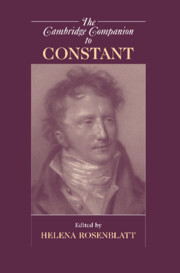Book contents
- Frontmatter
- Introduction
- 1 Benjamin Constant: Life and Work
- Part I The Political Thinker and Actor
- 2 Liberalism’s Lucid Illusion
- 3 The Liberty to Denounce: Ancient and Modern
- 4 Constant’s Idea of Modern Liberty
- 5 Benjamin Constant and the Terror
- 6 Constant’s Thought on Slavery and Empire
- 7 Benjamin Constant as a Second Restoration Politician
- Part II The Psychologist and Critic
- Part III The Analyst and Historian of Religion
- Conclusion
- 15 Eclipses and Revivals Constant’s: Reception in France and America 1830-2007
- Bibliography
- Index
- Series List
4 - Constant’s Idea of Modern Liberty
from Part I - The Political Thinker and Actor
Published online by Cambridge University Press: 28 July 2009
- Frontmatter
- Introduction
- 1 Benjamin Constant: Life and Work
- Part I The Political Thinker and Actor
- 2 Liberalism’s Lucid Illusion
- 3 The Liberty to Denounce: Ancient and Modern
- 4 Constant’s Idea of Modern Liberty
- 5 Benjamin Constant and the Terror
- 6 Constant’s Thought on Slavery and Empire
- 7 Benjamin Constant as a Second Restoration Politician
- Part II The Psychologist and Critic
- Part III The Analyst and Historian of Religion
- Conclusion
- 15 Eclipses and Revivals Constant’s: Reception in France and America 1830-2007
- Bibliography
- Index
- Series List
Summary
The modern revival of interest in republicanism (most notably associated with the names of Quentin Skinner and Philip Pettit) has unambiguously placed Benjamin Constant among the defenders of negative liberty. This is hardly surprising. In his famous lecture on the “Two Concepts of Liberty,” Isaiah Berlin, placing Constant along with John Stuart Mill among “the fathers of liberalism,” contended that “no one saw the conflict between the two types of liberty, or expressed it more clearly, than Benjamin Constant.” In a later introduction to his Four Essays on Liberty Berlin further asserted that Constant “prized negative liberty beyond any modern writer.” On this view, Constant demanded “a maximum degree of non-interference compatible with the minimum demands of social life.” Recent scholarship on Constant (echoing Berlin’s own claim that his attachment to negative liberty had been misunderstood) has sought to provide a more nuanced description of Constant’s understanding of liberty. Laurence Jacobs, for example, has forcefully argued that we are wrong to believe that Constant’s rejection of popular participation led him “to advocate privacy and a conception of freedom as freedom from politics.”
- Type
- Chapter
- Information
- The Cambridge Companion to Constant , pp. 69 - 91Publisher: Cambridge University PressPrint publication year: 2009
- 13
- Cited by

